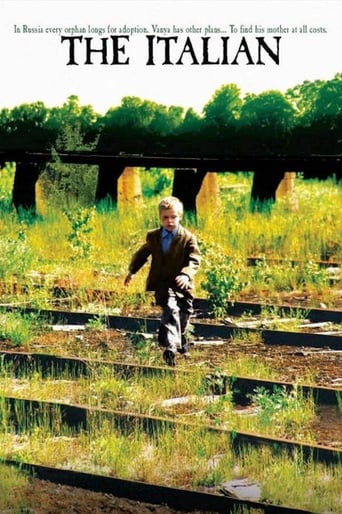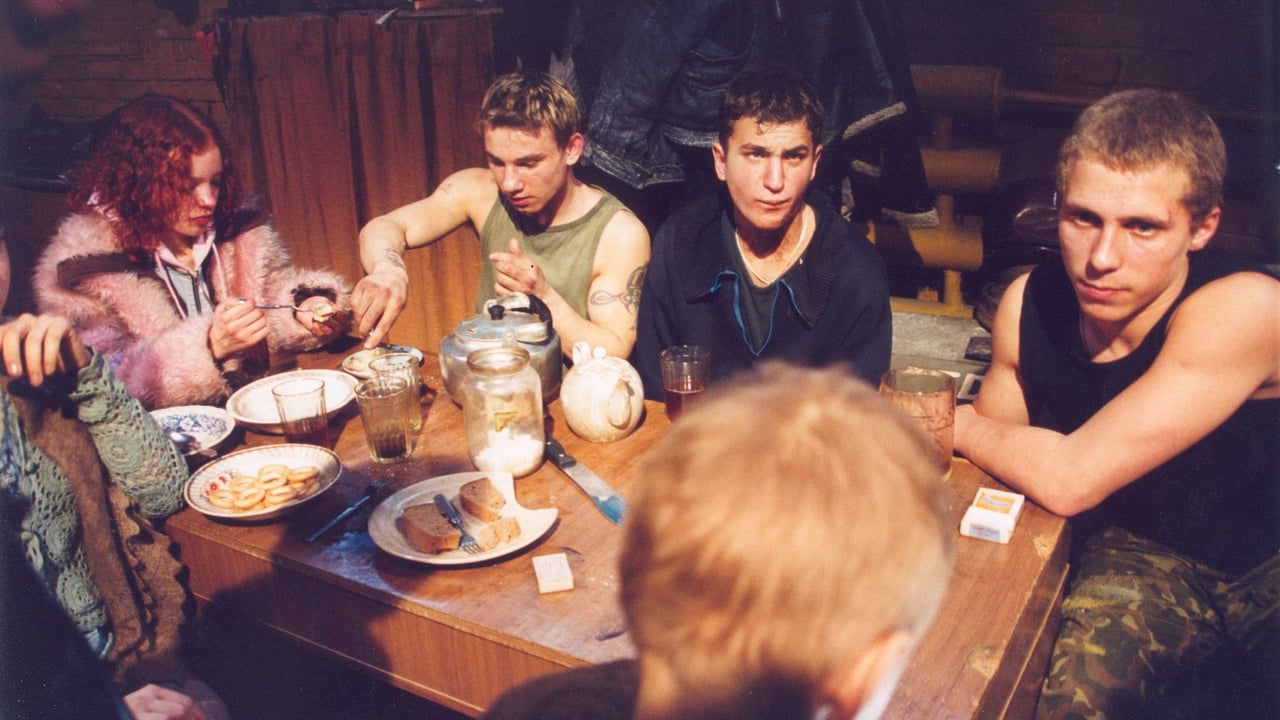jzland-1
Gorgeous, both emotionally and cinematically, this exquisite (based on a true) story holds you in its thrall to its end and beyond. I found that I was moved to care about the characters, and identified with motivations that each portrayed, particularly those of the young and courageous protagonist.A six-year-old boy, living in an orphanage in a poor section of Russia, is impassioned to find his real mother before he is sold to a couple in Italy. His urgent search, with several heart-stopping near-captures, shows how yearning and determination can change lives, at any age. Maturity and impassioned resolve are not the domain of adults only."The Italian" is both a love story and a thriller, and will expand your compassion in the viewing.
yc955
In the great continental tradition, the story is told in a rather subdued and understated fashion, without so much preachy debate and shouting match as the Anglo-Americans like to do. A lesser movie maker could have easily made this into a cheap tear-jerker. Comparing to movies such as 'Cider House Rules', this one is far more 'realistic' and down to earth. You can't help finding yourself following the boy's steps or even in his jacket with his every move. That is the power of great movies like this. The French movie 'Rosetta' comes to mind. But if that is a shiny gem, this is a field of diamond! It has a sustained power that stays with you and absorbs deeper as the minutes goes by. One other great point about this movie is that people are not black and white, humanities are abound despite the harshness and cruelty all around, perhaps with the only exception of the orphan trader herself. Then again, maybe that is what it takes to make a living like that anyway.I gave 9 instead of 10 because I am not convinced that Vanya could have mastered all the necessary reading skill in that short period of time at his age (5-6). Understanding the stuff from a formal document is not the same as guessing some short phrases from a 'Winnie the Pooh's book. Of course he could be a true genius. But this 'exception' feels forced comparing to all other characters and plot elements since there's nothing else that requires ostensible exception in life - all could have really happened. Even the weather was made to appear 'natural' rather than following the characters mood in the plot like less movies would have done. I can't help feeling that those who asked why the driver let the boy go were brain washed by the 'black/white good vs evil' Hollywood fairy tales (nonsenses) for too long. In real world, most people do have hearts. And it shouldn't take a Russian speaker to figure this one out.This is not a dark movie despite its plot line seems to suggest at the first glance. The true power of it lies in the beautiful warmth of humanity in many of the unlikely places, unseemly characters, and unfortunate moments. Life can be hard for some, but worthwhile if they try hard enough.No dramatic beginning or ending here. Everything just happened. But of course, all the details are there to make it all feels so natural and smooth. That's what the masters do.
Roland E. Zwick
"The Italian" is a touching tale of a six-year-old Russian orphan who goes in search of the mother who gave him to a foundling home when he was just an infant.Vanya has spent virtually his entire life growing up in a substandard orphanage run by an alcoholic director and a cold-hearted administrator. The children there live in virtual squalor with no effort on the part of the leaders to properly instruct or educate them. The future for most of these youngsters is a bleak one indeed, with a life of petty thievery and/or prostitution the most likely outcome for any of them not fortunate enough to catch the eye of some prospective, loving parent. Yet, as the movie begins, young Vanya's personal nightmare seems to be coming to an end as a kind Italian couple has come to Russia with the intention of adopting Vanya and taking him back to Italy with them. However, before the proper papers can be signed, the boy, sensing he must act quickly before it is too late, sets off on a long, arduous journey to see if he can find the mother who abandoned him as a baby."The Italian" is a compelling slice-of-life drama that has a great deal to say not only about the appalling conditions faced by orphans in Russia today, but about the determination of the human spirit and the need for love that exists at the center of every human heart. Director Andrei Kravchuk brings a near-documentary quality to the film, as he focuses his camera on the details of everyday life in the orphanage and the countryside through which Vanya travels. This air of naturalism extends to the actors as well, particularly young Kolya Spiridonov, who, as Vanya, gives a performance that can only be termed extraordinary and heartbreaking. After this film and the brilliant "The Return," I'm convinced that Russia has some of the finest child actors in the business. Indeed, there is nothing less than a superb performance in the entire film."The Italian" is a film tuned to the realities of life in a harsh environment, where cruel and violent deeds often share the stage with acts of random kindness. Vanya's epic adventure provides more than ample opportunity for him to experience both, but it is the magnanimity he encounters at the hands of strangers that lingers longest in memory.
Chris Knipp
The Italian/Italianetz is a good use of neorealistic effects almost worthy of Zavattini and De Sica to tell the story of a Russian orphan at the present time, a boy of six who's set up for adoption by an Italian couple and then determines to sneak off and see if he can find his own mother instead. Arranging adoptions on a freelance basis, apparently, outside the chaotic social system of present-day Russia, is a lady they call Madam (Mariya Koznetsova), plump, bossy, slick, followed around by a glum factotum, Grisha (Nikolai Reutov), who's her chauffeur, toady, and sometime lover. She makes a bundle out of each successful adoption by foreigners and makes free with bribes and threats to be sure her deals go through. A product of modern Russian capitalism, the money-mad Madam is more villain than fairy godmother.Using a photo followed up by an on-site interview at the detsky dom (children's home), Madam has arranged with an Italian couple, Roberto and Claudia, to adopt young Vanya Sonetsiv (Kolya Spridonov). But then when Vanya meets up with a remorseful drunken mom who apparently commits suicide after learning her child has been adopted and taken to Ialy, he gets the urge to investigate his own record. Everybody acts like he's such a lucky guy. But supposing he goes off with Roberto and Claudia? Mightn't he miss out on a chance to be reunited with his own mother, should she have a change of heart and want him back? Is there such a chance, though? And where is his mother? To find out, first Vanya has to learn to read a detail the orphanage has neglected and find a way to get a look at his file.The detsky dom's administration is not exactly on the up-and-up. The wild looking director (Yuri Itskov) is drinking up all the funds, and to fill in the vacuum this leaves a small clique of older boys to pretty much run the place and its finances, like a rawly capitalistic petty mafia, sporting scars, tattoos and muscles and throwing around words like "cosa nostra." Led by a boy named Kolyan (Denis Moiseenko), they have their own little systems of businesses and payoffs. And this shadow regime, up to a point anyway, really seems to work. The kids' beds are clean, and the girls mend their clothes and read them fairy tales at bedtime. But it's clear there's no pathway to a better future in the life here. Vanya, whom everybody now calls "the Italian" because of the good fortune they feel he's destined for when the papers go through in a month or so, now wangles his way in with the older boys, and they help him out. Among these undergrown mafiosi is a girl named Irka (Olga Shuvalova) who they pimp out to truck drivers. It's she who teaches Vanya to read. The big boys help Vanya break into the room where the records are kept and he gets the address of the maternal home where he came from, and Irka takes Vanya to the railway station, having robbed the boys' current till and intending to run off with him. Madam immediately finds out that Vanya has disappeared and, standing to lose her payoff if she can't deliver him to the Italian couple, she sets off in hot pursuit with Grisha.What follows is a wild chase in which Vanya shows what he's made of. Nothing, and that includes some pretty rough scrapes, can stop him from his relentless flight and quest. The Italian never loses its authentic flavor either as it moves toward an emotionally satisfying if somewhat hasty finish Still, it's obviously in the first half of the film that we get our best look at this world and its people and the Russian orphan problem. It might even have been a better treatment of that issue if some of the earlier scenes had been allowed to play out a bit longer.The San Francisco Chronicle's venerable Ruthe Stein called this the best "naturalistic performance by a Russian child actor since Kolya a decade ago." Spiridonov is very effective and appealing in his role, and perhaps The Italian has some links with that somewhat saccharine earlier film. But The Italian is more chastening than Kolya. A more appropriate recent comparison (and another great youth performance in Russian) is the picaresque, unpredictable Schizo (2004), directed by Guldchat Omarova with the 15-year-old Oldzhas Nusupbayev. The Italian isn't saccharine, but it's also not as grim a view of the plight of lost Russian children as Lukas Moodysson's deeply depressing 2002 film Lilja 4-Ever. See all four and decide for yourself which feels like the most convincing and cinematic story of Russian childhood. You'll have to consider whether Kravchuk undercuts or strengthens his material by turning it into a fairy tale. It was the urge to depict a growing social problem and at the same time tell an engaging story that must have drown a documentarian like Kravchuk to this subject. He has worked well with his non-actors and his writer Andrei Romanov, and Aleksandr Burov has provided a misty, subtly colored cinematography.


 AD
AD

